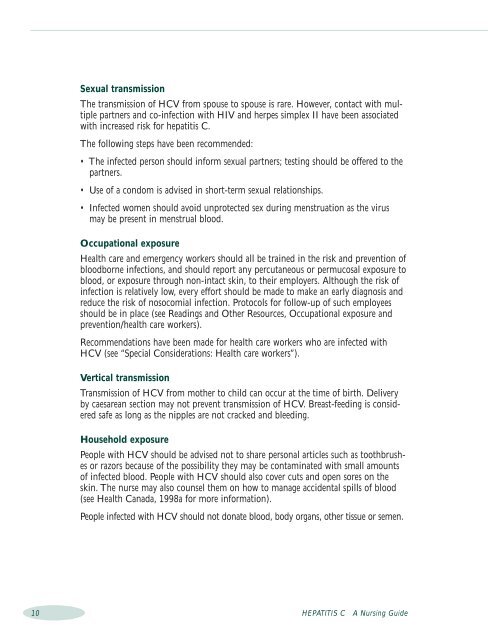Hep C - 2002.qxd - Canadian Public Health Association
Hep C - 2002.qxd - Canadian Public Health Association
Hep C - 2002.qxd - Canadian Public Health Association
Create successful ePaper yourself
Turn your PDF publications into a flip-book with our unique Google optimized e-Paper software.
Sexual transmissionThe transmission of HCV from spouse to spouse is rare. However, contact with multiplepartners and co-infection with HIV and herpes simplex II have been associatedwith increased risk for hepatitis C.The following steps have been recommended:• The infected person should inform sexual partners; testing should be offered to thepartners.• Use of a condom is advised in short-term sexual relationships.• Infected women should avoid unprotected sex during menstruation as the virusmay be present in menstrual blood.Occupational exposure<strong>Health</strong> care and emergency workers should all be trained in the risk and prevention ofbloodborne infections, and should report any percutaneous or permucosal exposure toblood, or exposure through non-intact skin, to their employers. Although the risk ofinfection is relatively low, every effort should be made to make an early diagnosis andreduce the risk of nosocomial infection. Protocols for follow-up of such employeesshould be in place (see Readings and Other Resources, Occupational exposure andprevention/health care workers).Recommendations have been made for health care workers who are infected withHCV (see “Special Considerations: <strong>Health</strong> care workers”).Vertical transmissionTransmission of HCV from mother to child can occur at the time of birth. Deliveryby caesarean section may not prevent transmission of HCV. Breast-feeding is consideredsafe as long as the nipples are not cracked and bleeding.Household exposurePeople with HCV should be advised not to share personal articles such as toothbrushesor razors because of the possibility they may be contaminated with small amountsof infected blood. People with HCV should also cover cuts and open sores on theskin. The nurse may also counsel them on how to manage accidental spills of blood(see <strong>Health</strong> Canada, 1998a for more information).People infected with HCV should not donate blood, body organs, other tissue or semen.10 HEPATITIS C A Nursing Guide
















